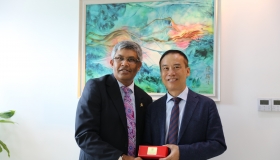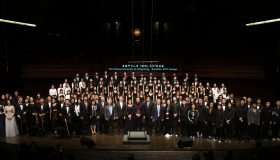Interview | Dr. Clark Lauren: A good teacher is a good learner
Dr. Lauren Rebecca Clark joined the School of Humanities and Social Science, CUHK-Shenzhen as Lecturer in English for Academic Purposes in September 2016. She obtained her M.A. in English Literature/French Language & Literature from the University of Glasgow and her Ph.D. in English Literature from the University of Sunderland, UK.
Dr. Clark has been teaching University Core English courses for year 1 students since she joined the English teaching team. She has been friendly, cooperative, hardworking, and professional. She is very passionate about her teaching and her courses are well-received by her students. Apart from her commitment in teaching duties, she has also volunteered to develop free elective courses, give talks, and assist in organizing school events that aimed at promoting the use of English on campus.
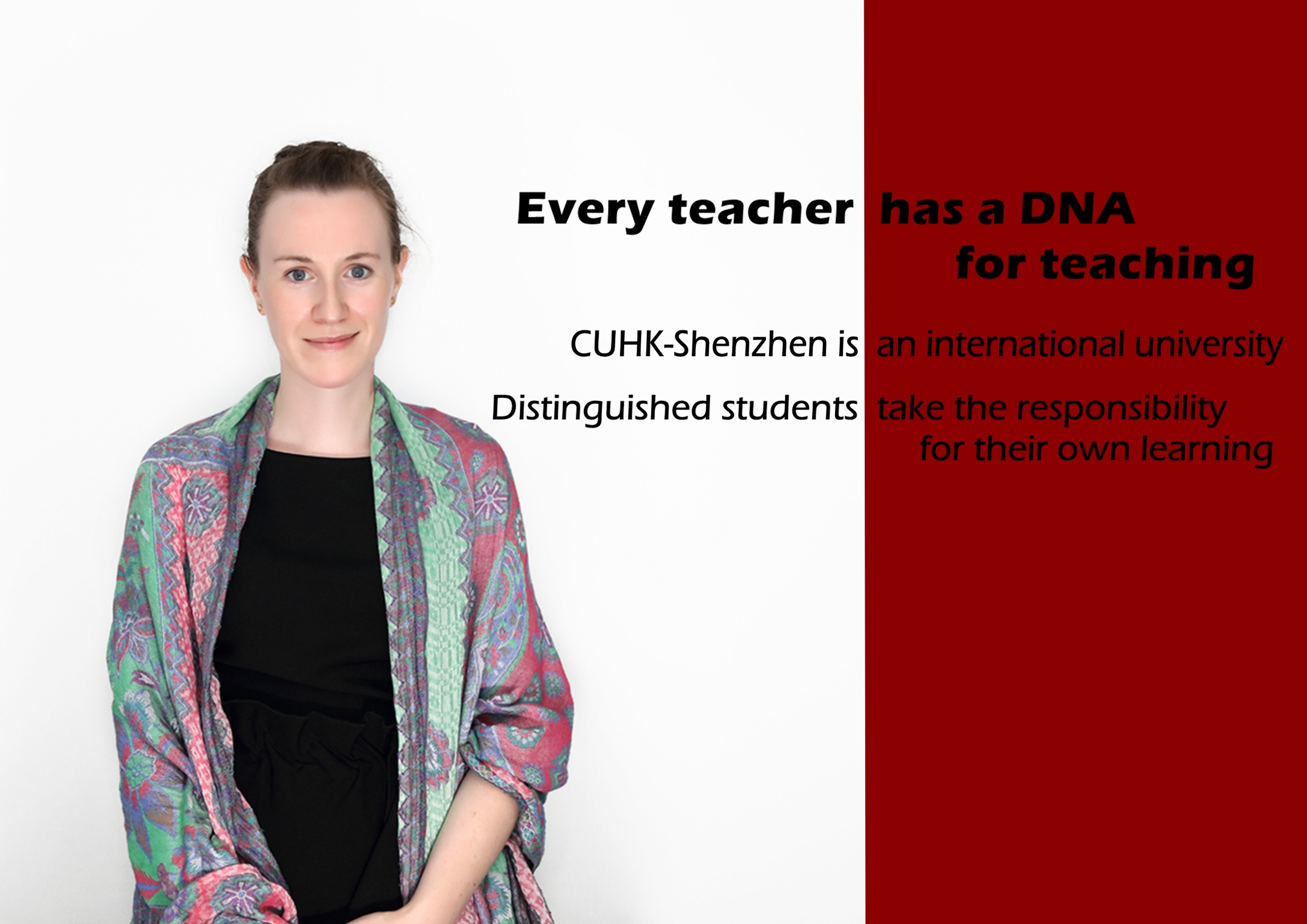
1. What are your aims in teaching English?
It depends on who I’m teaching and varies a lot. Sometimes I’m required not only to teach language and grammar and the language learning skills but sometimes how to read critically and how to research. One personal aim and aim for students is also about how foster understanding between cultures, because language is culture. When I teach English, it’s usually for a purpose; it is not only for my needs but also about the learners’ needs and how they fit into learning outcomes that will be beneficial for them.
Teaching this subject necessitates an understanding of English, and also soft skills. A soft skill is not a skill you can study per se. It comes from communication and practice and practical experience. These soft skills are also important in the study of English .
2. In what kind of way do you teach English?
I often use different methods to teach English dependent upon the setting. Teaching methodology is a huge discipline in itself. My preference here for example is the holistic method. It means that you teach using a variety of flexible approaches depending on the learners’ context. When I teach, rather than teaching from one book, I teach using different materials and media from society or the news or elsewhere as examples to illustrate the learning outcomes I wish to fulfill in any lesson. For part of the lesson, we might study a text;for part of the lesson, we may work in groups answering questions and discussing related points; for part of the lesson, the students might give spontaneous presentations. I also aim to make my class as student-centered as possible. Of course, this means the participation of the students is vital for it to function. The student-centered approach means students are responsible for their own learning as well. Provided they are involved in the class, taking responsibilities for their different activities, the method works very well and learning outcomes can be fulfilled.
3. Why did you choose to teach in CUHK-Shenzhen?
That is really a good question. I had never taught in China before and the rich culture intrigued me. I taught both Literature and Language in England, the Middle East and in Thailand. China is fascinating and Shenzhen is fast-paced compared to some of other places I had worked before. CUHK-Shenzhen is an international university in Shenzhen, which struck me as diverse and curious. I wanted to find more about China and where young people in China are likely to go in the future and to help them with language skills, which are contingent upon their development.
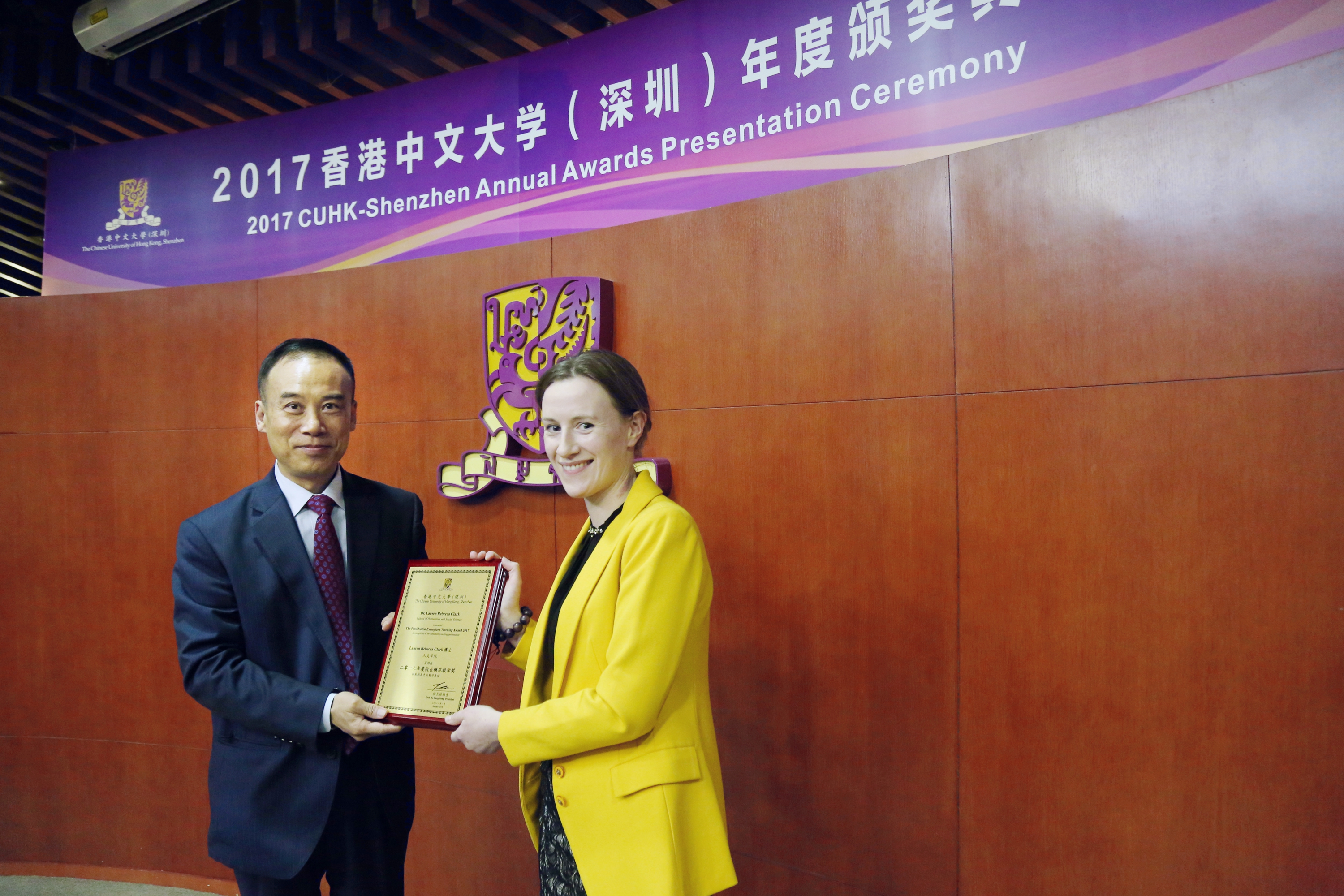
On January 25, CUHK-Shenzhen held the 2017 Annual Award Presentation Ceremony. Dr. Clark won the 2017 Presidential Exemplary Teaching Award.
4. What is your general impression of students in CUHK-Shenzhen and what kind of students do you prefer?
Individual preference has nothing to do with it. Every student is equal. Students who are distinguished are those who take the responsibility for their own learning. This has nothing to do with their proficiency or starting level. Those are the students who will do some extra reading or do some extra research, go the extra mile, or get excited about their upcoming essay or presentation. These kinds of students are also self-motivated. They will pose very good questions. It is a good way for a learner to be this way, and also a challenge for because you are testing the teacher’s ability and professionalism. Thereby it is constructive for both parties. I welcome questions and find resources for students to practice their English.
5. What are the differences between students in China and in Scotland?
Every student is different. These differences depend on personality, age and any number of factors instead of just their nationality. However, a few very general points can be noted. Chinese students tend to be extremely hardworking. Some have great discipline and focus. They focus on the individual work itself. Another point I notice regarding English is that some students tend to be shy when they speak English.
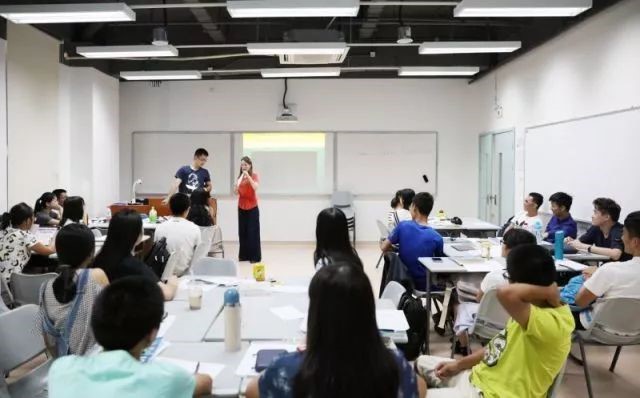
Dr. Clark 's class for freshmen in August
6. In your opinion, how can you be a good teacher?
A good teacher is a good learner. Every day you learn something. A teacher does not know everything, so they can never stop learning. So being humble and being modest in a teaching position means you can keep learning even from someone who is younger than you. Patience is another key aspect. Sometimes it takes a lot of patience to explain (what to you are) very basic concepts clearly, multiple times. It takes patience and observation to identify the students’ problems. Having the patience to see what the students true needs are is key as well.
Besides, good teaching involves looking at the students’ well being too. Encouraging them to come and ask questions during office hours and encouraging open communication is important.
I believe teaching is in the blood; every teacher has DNA for teaching. Metaphorically speaking. That said, teaching is something deeply personal. It is not necessarily that your father was a teacher so you will be a teacher. It’s me who wanted to teach. It is very satisfying to teach students something completely new. This is especially so in CUHK-Shenzhen where students are very quick to grasp important concepts. There is great delight in getting a group of people to understand something that will benefit their careers and futures one day. Further, good writing is satisfying to read and great presentations are satisfying to hear. Sometimes you find essays and presentations contain something you would never have thought about beforehand. Therefore, being able to foster their creativity and help to improve their language skills at the same time is wonderful. Teaching takes lots and lots of energy, but when it works best,,it is a reciprocal relationship. I seem to get a lot of energy from teaching and that is why I enjoy it.
7. How to get along with students as a teacher?
I use a textbook but sometimes I use other materials that I think are quite interesting to the learners. Getting along with students can be easier if the material is made interesting. Or if the material is not interesting, doing something interesting with it helps.
In terms of the generation gap between teachers and students, sometimes teachers can be a lot older than students; sometimes teachers might be a little bit older than students. However keeping in mind that there is a generation gap and understanding it will help the relationship develop. Nowadays, young people have substantial abilities and simultaneously a lot of pressure as well. Understanding where the students come from as individuals and understanding their needs is really fundamental.

